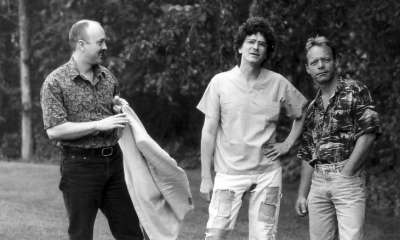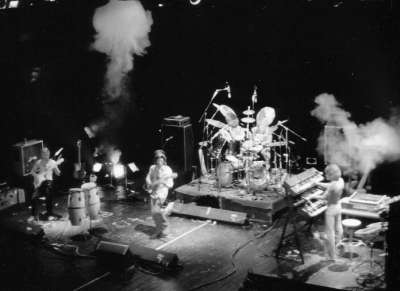Interview

(Progressive Newsletter Nr.42 12/02)
excerpts from an interview with Guy LeBlanc (Keyboards, Vocals)
When I wrote most of the songs for "Heretik", back in 1999-2000, I intended it to be a double cd. I develloped 12 songs - 6 per disc. But as the time arrived to record, I discovered that it was very difficult to wrap up this concept in 2 hours of material, and I decided then to develop the concept further, so it became a trilogy. It also made sense to me to record and release each chapter seperately at that point, so that I could release each one as it was conceived.
Over which period of time was the music composed and did the last two years had any influence especially on "Part 2" and "Part 3"?
Most of "Heretik Volume 1" was written between late 1998 and summer 1999, though some bits came from 1995 - vestiges from the unreleased "Radio Rehab" - and some from late spring 2000. Once I'd decided to make it a trilogy, I rewrote the story concept and changed a few of the songs from Volume 2, which was written mainly between January and June of 2001, but includes again bits from as far back as 1983. I composed the first 3 minutes of Volume 3 in August of 2001 and the rest of it in one week of late September 2001. Every disc I do is influenced by what I perceive of what is going on in my life and the world in general. Obviously I chose a "down" ending to the story because it just didn't make sense to me to do it otherwise, in view of what was going on in the world at the time.
Can you give an overview about the story behind "Heretik"? Is it a continous story and is there the something like a "message" in the whole concept?
"Heretik" is a tragedy in 3 acts. A man is arrested for the crime of speaking his mind, in a society that generally disregards dissent. This man, an artist, has so thoroughly made it his personal mission in life to expose corruption and moral decay, that those in power decide to make an example of his particular brand of dissent. Although he is given the benefit of a trial, his eventual execution is already plotted out when he's arrested. This story was inspired by a psychiatric textbook I read called "The manufacture of madness" by Dr. Thomas Szasz. To put it briefly, the book suggests that the people labeled heretics during the inquisition in Europe are now being labeled "mentally ill" in our modern age. The political motives of the accusers in both cases are far more revealing than the actions of the accused. So I guess that would be the kind of message I was attempting to impart.

Lateley "The people wish to be deceived..." a book by Mike McCormack about the making of Heretik Part II was released. Can you tell a little bit more about this project?
Mike McCormack is one of the great American poets of our Age; He approached me about doing a book on me and the band early in 2001, and came to Ottawa during the recording of "Volume 2", thus documenting the process of making an independent cd from the unique perspective of the outsider, and including all the ups and downs, and quite a bit of dirt, in the balance. :-) He draws an interesting parallel between the art and the artist; the daily works and the resulting musical landscape.
In which way did your envolvement with Camel influence your work with Nathan Mahl? Not only concerning time considerations, but maybe also musical-wise?
I don't think my work with Camel affects the sound of Nathan Mahl, since both are rather different bands. Being in Camel gives me the opportunity to explore musical areas I might not generally go to with Nathan Mahl, but I think that as a solo artist I might also widen my musical spectrum as a result of working with Andy Latimer. I still write Nathan Mahl songs for the specific NM bandmates, as usual.
Regarding the musical history of Nathan Mahl, which kind of feelings do you have and which development do you you see, when looking back to the all the albums from "Parallel eccentricities" to the "Heretik" saga?
Nathan Mahl started out, in 1980, as an offshoot of all our favorite prog and fusion bands of the time. It was always meant as a rather aggressive outlet for all our musical frustrations. "Parallel eccentricities" was an attempt to capture the essence of the kind of effect we had on our audiences - on the rare occasions when we did gig. I spent the next 2 decades - almost - learning and writing more music, and recording lots of stuff with different lineups. By the time "Heretik 3" was done, both Dan Lacasse (drummer) and Mark Spenard (guitarist) had returned to the band. All the different directions I've explored have taken me back to the most solid formation of the band we could have; the original one! If I didn't write tunes that these guys liked to play, they wouldn't have come back. Now we must really take this band out to gig!

"The clever use of shadows" will be re-released soon in the original way it was planned. Why took it so long to finally make this decision and what are the differences to the first release of the album?
I wrote all the songs for CUOS in 1995-96. I had no way at the time to record the album, much less release it. We saved up some money to record, but the deal fell through in 1997. I was approached by my guitarist at the time, who offered some recording time at a friend's studio he had accumulated from session work done on spec, and I accepted to do the same thing to get our record done. Anyway, that deal went sour over the course of the 8 months it took to record the cd, and by the time I was ready to release CUOS, the situation was rather intense and ugly. I did 2 pressings of CUOS, and the rest is history. But the guitarist wouldn't let it go; 2 years after he was fired from the band, he was still making claims that I ripped him off. So... I gave him the masters, and told him that he now owned the entire recording. I decided then to redo the entire piece, as I originally envisioned it back in 1996. So... "Shadows Unbound" will be released as a newly recorded work, featuring 4 songs that appeared on CUOS (but played by the new lineup) and 4 unpublished songs which were intended for CUOS.
Nathan Mahl unfortunatley plays rarley live, most of all I suppose it's a matter of time and most of all money like with most of the independent progressive rock acts. Would you'd like to have the chance to play on stage more often or do you feel more comfortable in the studio environment?
Nathan Mahl is a killer live band! We cannot afford to tour, and I personally don't want to do gigs where it costs us money to play in front of people. That said, it is becoming more realistic to envision doing small tours outside of Canada, because of the interest and support from fans and great publications like yours. So I think it's safe to say that Nathan Mahl will be doing quite a few live gigs in 2003, possibly even in Europe. I am very comfortable in the studio environment, but I also love to show this band off...
Are you satisfied with your role as an independent and artistically totally free musician in contrast of having the support of a major label, with all it's advantages and disadvantages?
I've had dealings with all sorts of people in the "music industry", and I find most of their concerns to be a total conflict of interests. I do music because I love music. I'm not interested in playing covers, being a session musician or anything like that. I'm not concerned with "image". I'm not a politically correct speaker. So it's safe to say that no major record label would want us anyway. I wouldn't want to work for one, anyway. I am totally satisfied with being independent; I sleep well at night.
Kristian Selm © Progressive Newsletter 2002